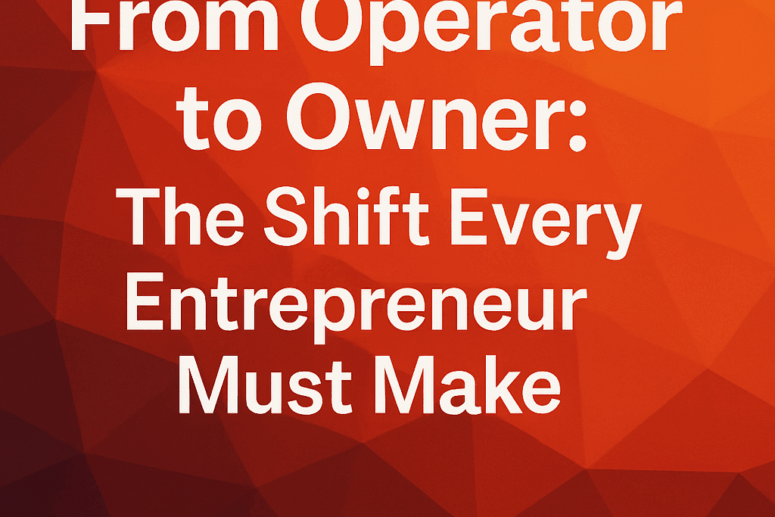“You can’t build the future you were made for if you’re stuck managing the day-to-day.”
If you feel like your business can’t run without you, you’re not alone. Many entrepreneurs start with a dream — only to find themselves buried in operations, overwhelmed by tasks, and running on fumes.
The real breakthrough happens when you shift from operator to owner.
This article will walk you through what that shift looks like, why it matters, and how to begin making it – one intentional step at a time.
What’s the Difference?
Operators:
- Wear every hat
- Chase daily fires
- Are stuck in the business
- Feel exhausted, reactive, and short on vision
Owners:
- Build systems and teams
- Lead from vision
- Work on the business
- Have time, margin, and clarity
💡 Ownership isn’t about letting go of responsibility. It’s about upgrading how you carry it.
Why You Must Make the Shift
Remaining an operator:
- Caps your income and impact
- Creates burnout and resentment
- Leaves your family and future waiting
Making the shift to ownership:
- Builds a scalable, sellable business
- Frees you to dream, lead, and expand
- Aligns with the Biblical principle of stewardship
“If you’re always in the weeds, you’re not planting trees for the next season.”
5 Steps to Shift from Operator to Owner
1. Audit Your Time Ruthlessly
Before you can lead like an owner, you need to understand where your time is actually going. Most entrepreneurs underestimate how much time they spend on low-value tasks like email, scheduling, or putting out fires.
Why this matters:
Time audits expose the gap between where you think your energy goes and where it actually goes — and help you reclaim hours for leadership and strategy.
Action Step:
Use a free tool like Toggl or Clockify to track your hours for 5 days. Label each activity: admin, sales, client delivery, leadership, etc. Highlight anything that could be automated or delegated.
“You can’t delegate what you don’t measure.”
2. Document Everything You Touch
Owners don’t just get things done — they build systems so others can get them done consistently. When everything lives in your head, you stay the bottleneck.
Why this matters:
Documentation is the bridge between your involvement and your freedom. It allows you to scale without sacrificing quality.
Action Step:
Start a Google Drive folder labeled “Playbook.” Record screen-share videos (Loom is great) or create checklists for daily/weekly tasks. Start with the things you do repeatedly.
“If you do it more than twice, it needs a system.”
3. Build a Team That Owns Outcomes, Not Just Tasks
A team that waits for instructions isn’t a team — it’s a to-do list with legs. True owners develop leaders who take initiative and solve problems.
Why this matters:
Empowered team members drive growth. When people are responsible for results, not just tasks, they act like partners — not placeholders.
Action Step:
During your next team meeting, ask this: “What results are you responsible for this week?” Then support them with the tools and clarity they need to deliver. Reward ownership, not just obedience.
“Leadership is not about telling people what to do. It’s about creating clarity, accountability, and trust.”
4. Block Time for Vision Work
If you’re stuck in tasks, no one is steering the ship. Owners invest time in planning, praying, and designing a better future.
Why this matters:
Vision isn’t a luxury — it’s leadership. Without it, you’ll run in circles, build from burnout, or let the market decide your direction.
Action Step:
Block 1-2 hours each week on your calendar labeled “Vision Time.” Use this space to pray, think, read, strategize, or journal. No tasks. No meetings. Just clarity and space to hear from God and lead with purpose.
“Don’t let the urgent bury the eternal.”
5. Set Boundaries Between You and the Business
Business can be all-consuming. But a burned-out leader builds brittle systems and fractured families. Owners set boundaries because they know they matter beyond the business.
Why this matters:
Boundaries protect what truly matters: your soul, your relationships, your calling. They also model healthy leadership for your team.
Action Step:
Define your business hours – and stick to them. Turn off notifications after hours. Choose a weekly Sabbath to disconnect completely. Let your team know you value rest and results.
“Rest isn’t retreat. It’s resistance to a world that never stops.”
Final Thought
You didn’t start your business to build a box you’re trapped in.
The shift from operator to owner is more than a productivity tactic — it’s an identity upgrade.
It’s about leading with purpose, not just pressure.
You are called to build, delegate, empower, and expand – not to stay stuck in the weeds.
Apply This Today:
- Track your time for the next 5 days
- Pick 1 task to document and delegate
- Schedule your first “Vision Hour” this week
- Read through The Peril of Pride

